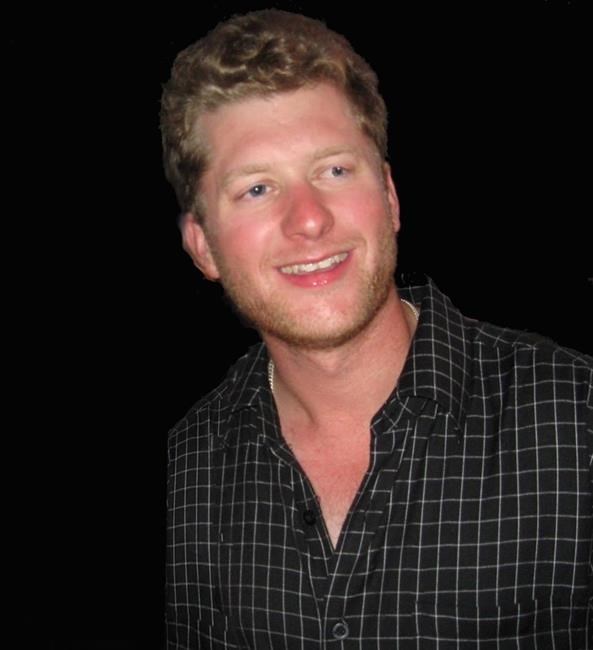BURNABY, B.C. — Had Myles Gray not interacted with Vancouver police on Aug. 13, 2015, he likely wouldn't have died that day, a forensic pathologist told the inquest into his death.
Dr. Matthew Orde testified Thursday that a "perfect storm" of factors led to Gray's death, including his extreme exertion and the actions of police to restrain him.
The inquest has heard the initial 911 call was about an agitated man who was yelling, behaving erratically, and who had sprayed a woman with a garden hose.
Orde said he believed Gray had been experiencing an acute behavioural disturbance and his body would have been working in overdrive as he struggled with police.
The inquest has heard officers punched the 33-year-old in the face, delivered blows to his body and used a manoeuvre that applied pressure to the sides of his neck before forcing him onto his stomach and handcuffing his arms behind his back.
"What we can say with some degree of certainty, based on the reported circumstances surrounding Mr. Gray's death, the autopsy findings and a careful analysis of the published literature, is I don't think he would have died when he did had it not been for the police interaction on that day," Orde told the inquest.
Gray's heart would have been pumping rapidly and he would have been breathing heavily, his body working to expel lactic acid and carbon dioxide, Orde said.
People who are forcibly restrained on their stomach are at greater risk of death, especially when their body has increased physiological demands, he said.
The pathologist performed an autopsy in the days after Gray died. He had sustained multiple blunt force injuries to his face and body, Orde said.
Gray had bruises consistent with being struck with a rigid object, such as a police baton, as well as a "blowout fracture" in one of his eye sockets, a fractured nasal bone and rib and hemorrhaging in his testicles, he said.
Orde said bone-like cartilage in Gray's larynx was fractured, his jaw was "loose," indicating partial dislocation, and he had minor, localized bleeding around his brain.
Some kind of "neck hold" likely explains the fracture in Gray's voice box, he said.
While none of the physical injuries alone provide a good explanation as to why Gray died, Orde testified that autopsies cannot assess potential physiological factors.
Such factors are key to understanding Gray's death, he said.
Orde concluded that Gray died as a result of cardiac arrest complicated by police actions to restrain him as he experienced an acute behavioural disturbance.
The expert witness pointed specifically to police actions including "neck compression," blunt force injuries, the use of pepper spray and forcing Gray into a prone position, holding him on his stomach and handcuffing him behind his back.
"In the context of someone who's extremely fatigued, (whose) body is fully ramped up ... I think these issues would be enough to tip him over the edge," Orde said.
Orde said the behavioural disturbance Gray was experiencing that day contributed to his death only insofar as it led him to the situation he was in when he died.
Several of the 14 Vancouver police officers who have testified so far said they believed Gray was experiencing a condition they described as "excited delirium."
Orde told the inquest the term has been used in the past to describe a "constellation" of agitated behavioural patterns. On occasion, it was thought "so-called excited delirium syndrome" could result independently in death, he said.
"But I think critical analysis of the published data suggests that's probably quite unlikely," Orde testified. "I'm not persuaded that there's any good evidence that excited delirium syndrome can independently bring about death."
Coroner Larry Marzinzik had provided the jury with what he called a "cautionary note" about the term excited delirium earlier in the two-week inquest.
He said it's not recognized as a cause of death by most pathologists and the jury members should put less weight on the evidence of a lay person on the topic.
The chief civilian director of B.C.'s Independent Investigations Office, Ronald MacDonald, also testified Thursday, saying he believes current training related to the use of force teaches police to categorize behaviour more than to analyze it.
"I think we need to start to work on a process that teaches officers how to better critically assess and to do better critical thinking in situations," he said, adding police should also receive training to improve de-escalation skills and outcomes.
The years-long investigation by the police watchdog ultimately found reasonable grounds to believe an offence may have been committed, and MacDonald's office submitted a report to the BC Prosecution Service for consideration of charges.
The service announced in late 2020 that it would not pursue charges against the officers involved in the struggle to arrest Gray, saying police were the only witnesses and the Crown couldn't prove any offence had been committed.
The 10-day inquest is scheduled to end Friday.
An inquest jury isn't able to make findings of legal responsibility but it may make recommendations to prevent similar deaths in the future.
This report by The Canadian Press was first published April 27, 2023.
Brenna Owen, The Canadian Press



